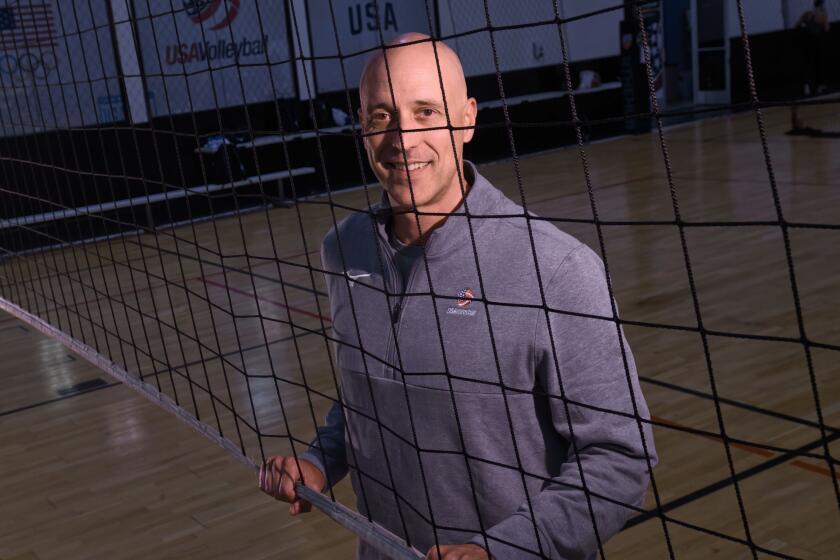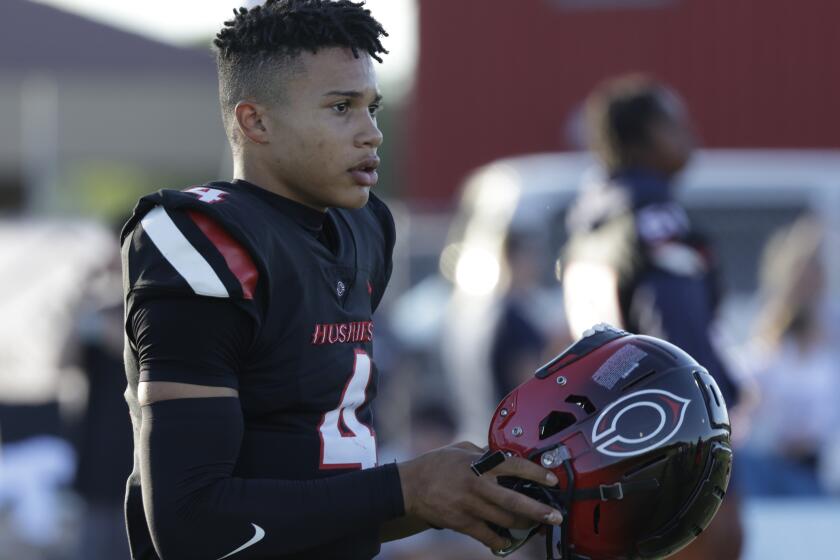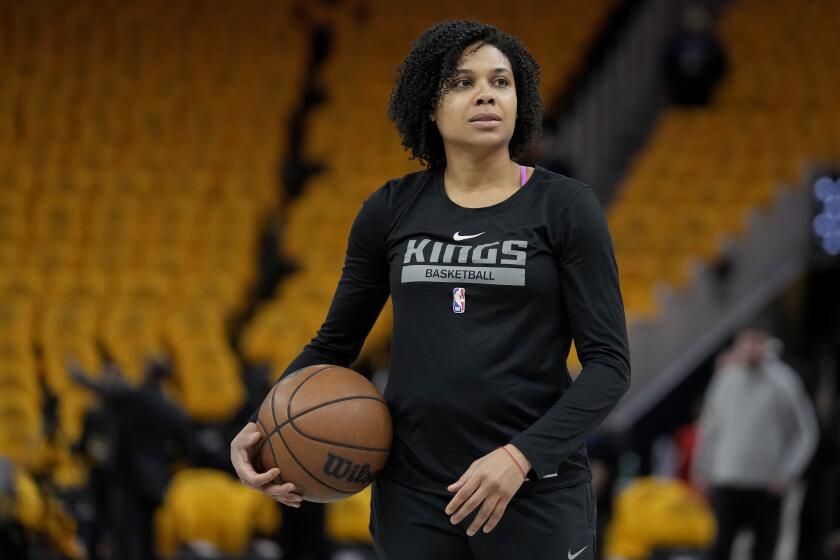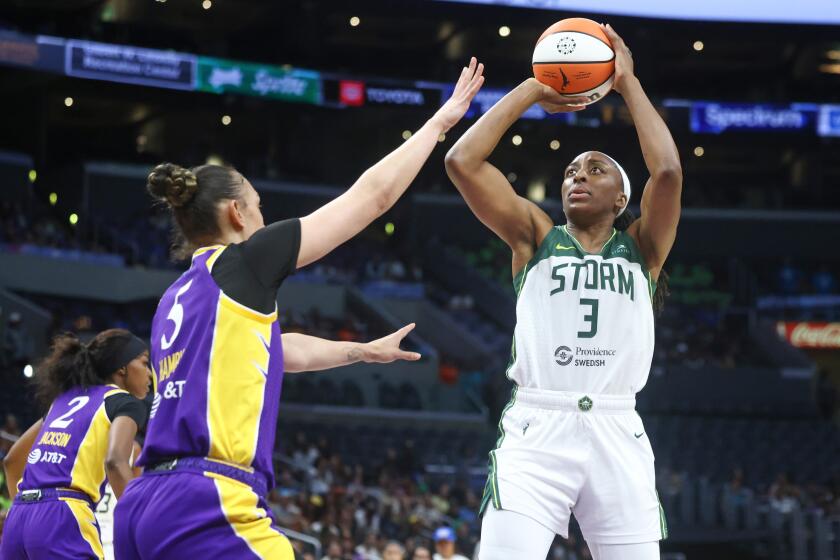A QUIET AFFAIR : How Sports Agents Bloom, Walters Worked in Secrecy
They stormed into the sports-agency business with an open checkbook and a hidden agenda--and the sports-agency business never has been the same.
From college town to college town they traveled, huddling in cramped hotel rooms with star athletes, signing them to secret contracts that jeopardized their eligibility under NCAA rules.
NCAA rules? Norby Walters and Lloyd Bloom cared not a whit about NCAA rules. “Excuse me, I don’t belong to their organization,” Walters said. “The NCAA, I’m not going to let them tell me how to run my business,” Bloom agreed.
So when Texas running back Edwin Simmons seemed interested in hiring an agent before his senior season last summer, Walters and Bloom loaned him $4,000 to seal the deal.
And when Purdue all-America cornerback Rod Woodson--another pre-season recruit--wanted to take his girl friend and parents to the Hula Bowl in Hawaii, arrangements were made.
“I paid their hotel bills, plane fares and gave Rod’s mother over $1,000 to go shopping,” Bloom said. “I gave them the time of their lives.”
By January of this year, Walters and Bloom had become the hottest secret agents since 007, having signed some 30 college athletes, eight of whom would be selected in the first round of the NFL draft. “We were the talk of the sports world,” Walters boasted. “We did our job so good that we rocked the entire damn sports community.”
Then, suddenly, the empire they called World Sports & Entertainment Inc. began to collapse.
First, no fewer than 20 of Walters’ and Bloom’s clients defected to other agencies. Then came published allegations that Walters and Bloom had threatened former clients with bodily harm. And, in April, a federal grand jury investigating alleged use of drugs, fraud, violence and prostitution in the sports agency business began asking questions about them.
Today Walters and Bloom are well on their way to becoming the most investigated agents in the history of sport--and an intriguing picture of their once-secretive business practices has begun to emerge.
For their part, Walters and Bloom, who say they have not violated any civil or criminal laws, cannot understand what all the fuss is about.
“I mean, Gary Hart’s thing--he runs for president of the United States--is already forgiven,” said Bloom, 28, a former nightclub promoter and collections agent who lives in suburban Los Angeles. “But this crap is in the paper every day. Who the hell am I to be in the papers every day? I’m meaningless.”
“I’ve never even been picked up for a speeding ticket,” said Walters, 55, a New York City-based booking agent for black entertainers, including Patti LaBelle and Kool and the Gang. “I am so damn stupidly legitimate, it’s incredible.”
Suffice it to say: Norby Walters and Lloyd Bloom are no longer rocking the sports agency profession. Today, it is they who are being rocked:
--Already dozens of athletes have been subpoenaed to testify before the grand jury empaneled in the Federal Building in Chicago. According to sources familiar with the investigation, the grand jury is looking into allegations of extortion, racketeering, wire fraud and mail fraud in connection with their signing of--and loaning money to--college athletes.
Some athletes also could face charges of fraud, for knowingly violating the terms of their scholarships, and tax evasion, for failing to report monies received from WSE.
Martin Rauch, a lawyer who represents former Iowa running back Ronnie Harmon, was asked by a U.S. attorney if he had any information about the 1986 Iowa-UCLA Rose Bowl being fixed.
Harmon, a former WSE client who now plays for the Buffalo Bills, had four fumbles in the game, won by UCLA. Rauch said he told the federal prosecutor: “I don’t know anything about a fix.” Rauch has instructed Harmon not to talk to the news media.
Asked recently where he thought the grand jury investigation was going, Walters said: “To hell, I hope.”
--At NCAA headquarters, enforcement director David Berst said he “would not be surprised” if a dozen or more college athletes are declared ineligible for having signed with--or taken money from--Walters and Bloom. According to Bloom, WSE has loaned several hundred thousand dollars to college athletes over the last two years.
WSE has filed suit against six athletes, charging them with breach of contract and failure to repay loans or expenses. “We have some information about certain players (who have eligibility remaining),” Berst said. “We’re going to try to develop further information this summer.”
Already, Alabama basketball star Derrick McKey has been declared ineligible for his senior year because he signed with WSE. Last week Pittsburgh football players Charles Gladman and Teryl Austin reportedly were suspended from their team following a university investigation into their alleged association with WSE. Austin reportedly said he accepted money from Walters. Gladman has denied the allegation.
--In Washington, the NFL Players Assn.’s agent-certification committee is investigating allegations that Bloom and Walters threatened former WSE clients with physical harm. The investigation could lead to Bloom’s decertification as a registered agent. (Walters never applied for NFLPA certification.)
Bloom said an NFLPA official notified him that two athletes-neither of whom was identified by the union-complained of being threatened by Bloom. Bloom said of the allegation: “I could never harm anyone. Ask my wife. She’ll tell you that I’m afraid to even kill a bug.”
In March the Atlanta Constitution reported that two former WSE clients had informed the NFLPA that they had been threatened by Walters. “Both players’ stories were almost identical,” the Constitution quoted an NFLPA source. “They said Walters called them and told them, ‘I’m going to talk to my people in Las Vegas and get them to break your legs.’ ”
Walters said of the allegation: “The NFLPA is totally, completely full of crap.”
--Throughout these investigations, Walters and Bloom have been objects of intense scrutiny by news media. Bloom complained that a reporter phoned a former high school teacher “looking for dirt about me” and that he was stalked by a photographer at Los Angeles International Airport. “I tried to hide my face from the camera,” Bloom recalled. “I felt like a criminal.”
Walters had been questioned by reporters about his association some two decades ago with John (Sonny) Franzese, a reputed captain in the Colombo crime family.
Walters explained in an interview with The Washington Post, “I’m an agent now for 20 years. But 15 years before that I was a restaurant owner in New York. I owned 21 different places. When you’re in the restaurant business, you really meet a lot of people. I mean, you really meet a lot of people. . . . I knew (Franzese). You know, he was just a kind of a person that you know.”
Walters said he had no business relationship with Franzese, who in 1967 was sentenced to 50 years in prison for conspiring to rob banks. Franzese was paroled after serving 10 years, but later was recommitted to a federal prison for violating the terms of his parole.
How did Bloom and Walters get in this mess?
Bloom allowed the faintest of smiles.
“Good question,” he said.
In the spring of 1984, Bloom was working for his father’s credit and collections business in Westchester County, N.Y., and promoting “theme nights” at glitzy Manhattan discos.
The work was fine, but Bloom, 24 years old, was itching for a change. “I wanted to become a sports agent,” he said. Why? “Because I felt agents weren’t doing right by the athletes. They were really ripping them off.”
Bloom could not afford to bankroll his own business, so he called on Walters, whom he had met six years earlier at a Gloria Gaynor-Village People concert.
“I said, ‘Norby, you’re No. 1 in black music. Your company is a very legit company. Very big. Why not expand it to sports?’ ” Bloom recalled. “Norby liked the idea. He said, ‘Great.’ I said, ‘I’ll do the legwork, and you fund the business.’ He said, ‘Fine.’ ”
Their first client was Tracy Henderson, a wide receiver from Iowa State who, according to Bloom, signed with WSE after the completion of his eligibility. Henderson was selected by the New York Giants in the fifth round of the 1985 draft.
In the midst of contract negotiations, Walters invited Giant General Manager George Young to his office on Broadway.
“A nice man,” Walters said of Young. “When he came to my office, he looked around and said, ‘There’s no question in my mind that in 24 months you’ll be the biggest agent in sports. You can’t be this (a successful entertainment agent) and not be that (a successful sports agent).’ ”
Walters later invited Young to a party at Visage, a Manhattan disco. “There were 2,000 people wall-to-wall, just everybody in show business,” Walters recalled. “And these were only my closest and dearest friends. George couldn’t believe that a businessman would throw a party for 2,000 people and be surrounded by stars all over the place.”
For a while, WSE had only one client--Henderson. “I told Norby that most of the college athletes had already signed with other agents,” Bloom remembered. “Norby said, ‘Ah ha! That’s the game! If they’ve all signed early, then the only way is to join them and beat them doubly at their game.’ ”
Walters and Bloom, who are white, decided they would recruit only black athletes. “We stick to blacks,” Bloom said. “That’s what we know best. We’re plugged into the black market.”
Would they even attempt to recruit a white athlete?
Bloom shook his head.
“If I go to a black concert, an R & B show, everybody’s dressed up, everybody’s moving in a good groove,” he explained. “You go to a white rock ‘n’ roll concert, like the Rolling Stones or Bruce Springsteen, everybody looks like a mass murderer, like they’re capable of going to McDonald’s and blowing up the whole joint. It’s just a different type of group. I’ve never recruited a white athlete.”
WSE’s first undergraduate client was Ronnie Harmon, who was signed in the spring of 1985, as a junior. Over a one-year period, Harmon accepted $54,172 in loans from Walters and Bloom, according to a lawsuit filed by WSE. In his answer to that suit, Harmon admitted signing with WSE during his junior season but denied receiving that amount of money.
The other afternoon, at the townhouse in Sherman Oaks, Calif., that he shares with his wife, actress Donna Denton (former co-star of “Mickey Spillane’s Mike Hammer”), Bloom described the system he has used to recruit and sign clients:
“First,” he said, “I’d get the player’s phone number. . . . You know, call the football office (at a university) . . . you know, use whatever I can to get a phone number.”
Once he contacted the athlete, he would make his best pitch: “Patti LaBelle--one woman alone--makes more than four first-rounders. So if we’re capable of handling her career, we sure can handle you.” And if that didn’t work: “What are you going to do? Go with some local, broken-down attorney?”
If the athlete seemed interested, Bloom said he would warn him about the risks of violating NCAA rules: “ ‘If this gets out, you can lose your eligibility. But we’re the only ones who know about it. So it shouldn’t get out unless you brag. Because we’re not going to brag about it.’ ”
As an inducement to sign, Bloom said, he would offer to loan the athlete some money, which would not have to be repaid, he said, if the athlete did not sign a pro contract. “So I was the one who was gambling,” Bloom said. “Instead of going to Atlantic City or Las Vegas, I was gambling that a kid’s going to be a thoroughbred.”
Finally, Bloom said, the athlete’s contract with WSE would be postdated (presumably so it could not be used as evidence that the athlete had violated NCAA rules). “We postdated the contracts to protect the kids,” Bloom said. “And to make everything easy, understandable.”
In the spring of ‘86, Walters and Bloom really got rolling.
In Austin they signed Simmons, the junior running back at Texas. “He got a total of $4,000 to sign,” Bloom said. “Then he even brought his teammates and friends. He said, ‘If you bring me $1,000 a player I can bring you a lot of stars.’ ”
Bloom said he agreed to pay Simmons a $1,000-per-player finder’s fee. “Edwin said, ‘Don’t go anywhere. I’ll be right back. I’m going to find my other teammates,’ ” Bloom recalled.
Two hours later, according to Bloom, Simmons returned with William Harris, a 6-foot-5, 235-pound tight end who would later transfer to Bishop College in Dallas.
“William Harris says, ‘Oh, man, this is unreal. Look at this: You’re representing Patti LaBelle. You’re representing stars,’ ” Bloom said. “He told me he couldn’t sleep for two nights after he signed with us, he was so excited. He was with the agent of the stars.”
A week later, Bloom said he returned to Austin to sign Everett Gay, a junior receiver for the Longhorns.
“I got so excited that I signed three in one shot from one school, I was having palpitations,” Bloom said. “I thought I was going to have to check in for an electrocardiogram.”
Simmons’ lawyer, Willie Anderson, confirmed that his client signed with--and accepted money from--WSE before his senior season. Anderson said he did not know if Simmons requested or received any finder’s fees. Simmons was not available for an interview last week.
Gay has admitted signing with WSE before his senior season. Harris declined to comment on his alleged relationship with WSE.
Bloom and Walters said they did not hesitate in giving athletes a chance to break NCAA rules, because they believed many had already accepted under-the-table payments from coaches and boosters.
“If the universities are breaking the NCAA rules, why blame the agents?” Bloom said.
So they pushed on:
--To Dallas, where, according to Bloom, they signed four SMU juniors: Jerry Ball, Ronald Morris, Jeff Atkins and Terrance Mann. “Then I returned to Dallas to watch them play in their spring game,” Bloom recalled. “I felt like I was in the clouds. I mean, it was really great.” Ball confirmed that he signed with WSE as a junior. Steve Endicott, an agent representing Morris, Atkins and Mann, has instructed his clients not to make any public comments.
--To Pennsylvania, where they signed Pittsburgh defensive lineman Tony Woods, who was later invited by his new agents to a premiere party in New York for “The Golden Child,” a movie starring Eddie Murphy. “I introduced Tony Woods to Sylvester Stallone and Eddie Murphy,” Bloom said. “He met Patti LaBelle and hung out with Patti LaBelle all night. I mean, he was going crazy. Tony said, ‘Man, this is the greatest!’ ”
--To Alabama, where they signed Auburn running back Brent Fullwood. “We signed him before his senior season,” Bloom said. “We told him, ‘You know, it’s against NCAA rules.’ He says, ‘No problem.’ ” Fullwood, a first-round draft pick of the Green Bay Packers, admitted through his agent, George Kickliter, that he signed with WSE before his senior season but denied that Bloom had warned him about NCAA rules.
No fewer than half of WSE’s 30 recruits last year were signed before their senior seasons, according to Bloom. The secret to WSE’s success? “I think it was just that we had the power of a major music company,” Bloom said. “And that music is America.”
As this year’s NFL draft approached, some 20 WSE clients, including Atkins, Morris and Simmons, decided that Walters and Bloom were no longer playing their tune.
“They got scared,” Bloom said. “Other agents were talking bad about us.” During one three-week period, Walters and Bloom’s names were mentioned frequently in unfavorable contexts.
On March 6, a man was shot and killed in Dallas while driving a Datsun 300ZX owned by Atkins. Police did not rule out the possibility that Atkins was the target of the shooting. Walters’ and Bloom’s names were mentioned in news reports about the shooting. Police found no evidence that Walters and Bloom were in any way involved in the incident. Walters said recently: “I’m an agent. What do I know about people getting shot in cars?”
On March 12, Walters was quoted in the Constitution as saying he signed and loaned money to players before their completion of their eligibility.
Four days later, Kathe Clements, an associate of Skokie, Ill., sports agent Steve Zucker, was stabbed and beaten unconscious by a man who entered her office wearing a ski mask and black gloves.
Again, there was speculation in the media that Walters and Bloom could have been involved, because of a dispute they had had with Zucker over a client. But again, police found no evidence that they were involved. Walters and Bloom said they were not involved in any way. Walters said he told two FBI agents, who questioned him about the incident: “Listen, I don’t even know where the hell Skokie, Illinois, is. I never heard of the damn place.”
Then, on March 28, The New York Times reported that the FBI office in Dallas was in possession of a recording of a phone conversation between Bloom and former SMU player Morris during which Bloom threatened to have Morris’s hands broken if he signed with another agent.
Bloom said in an interview with The Washington Post that he was indeed angry that Morris had fired WSE. Of a phone conversation with Morris, Bloom recalled: “I could have said something and got angry and yelled . . . saying, ‘Your stupidity! How can you want to leave? I mean, why? What did we do wrong by you?’ Raising my voice and yelling like I would yell at my wife or something.”
But he added: “I would never threaten anybody.”
Howard Pearl, the Harvard-educated assistant U.S. attorney who is spearheading the grand jury investigation, seems intent on exploring every dark alley in this ever-darkening scandal.
According to sources familiar with the investigation, athletes are being asked if Walters, Bloom or any WSE employee offered them drugs or prostitutes.
“Drugs? Let me put it to you this way,” Walters said. “If right now you asked me where to find a marijuana cigarette, I wouldn’t know where to find one.”
Prostitutes? “Right now,” Walters said, “if somebody in this show-business life--the fast lane--asked me, ‘Do you know a prostitute?’ I would have to find out, ‘Does somebody know one somewheres?’ ”
Walters called the investigation a “witch-hunt” and charged that the 33-year-old Pearl is interested primarily in “getting his name in the papers so he can get himself a good job with a major law firm in Chicago.”
Pearl declined to respond to Walter’s allegation or to discuss any aspect of the investigation.
Norby Walters and Lloyd Bloom say they will continue to do business as usual. They still have 10 clients, they say, and the 1987-88 recruiting season is upon them.
“In the football business there are so many sleazy bums--broken-down valises, I call them--who don’t have two quarters to rub together,” Bloom said. “So I’ll be back. I’ll be darned if I’m going to let the other agents defeat me. I’m going to come back stronger than ever.”
More to Read
Go beyond the scoreboard
Get the latest on L.A.'s teams in the daily Sports Report newsletter.
You may occasionally receive promotional content from the Los Angeles Times.






